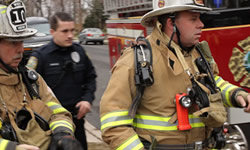

September 11th Victim Compensation Fund Act - H.R.1327
CRS Summary
Never Forget the Heroes: Permanent Authorization of the September 11th Victim Compensation Fund Act
This bill funds through FY2090 the September 11th Victim Compensation Fund of 2001.
- Additionally, the bill modifies the Victim Compensation Fund (VCF):
- •to allow claims to be filed until October 2089,
- •to require VCF policies and procedures to be reassessed at least once every five years (currently, at least once annually),
- •to require claimants to be paid for the amount by which a claim was reduced on the basis of insufficient funding,
- •to remove the cap on noneconomic damages in certain circumstances, and
- •to adjust the annual limit on economic loss compensation for inflation.
A day after comedian Jon Stewart spoke to lawmakers for their sparse attendance at a hearing on legislation to help victims of the Sept. 11 terrorist attacks, the House Judiciary Committee approved the bill (HR 1327) without even calling a roll call vote, extending a victims fund for decades while offering whatever funding is needed.
Stewart and lawmakers representing the victims have expressed frustration at Congress' pace in moving the legislation, even after the overseer of the victims fund, Rupa Bhattacharyya, announced in February that she would have to cut payouts to victims for lack of money.
The full House and Senate still must pass the bill and President Donald Trump must sign it before victims can expect to receive the amounts Bhattacharyya sees as appropriate compensation. But if some lawmakers had concerns about providing unlimited funding, they disappeared at the Wednesday committee vote.
The number of victims requesting compensation has exploded in recent years as more first responders have gotten sick, believing their ailments are linked to toxins created when the World Trade Center towers fell and the cleanup at the Pentagon.
Bhattacharyya said earlier this year that from 2011 to 2016, 19,000 people sought compensation. That figure was eclipsed in the following two years and in January of this year nearly 5,000 people sought payouts.
Congress created the fund 11 days after the attacks to help victims, while also shielding from liability the airlines whose planes were flown into the towers, the Pentagon and a field in southern Pennsylvania. The fund pays out different amounts based on a victim's expected lifetime earnings had the victim not died or been rendered unable to work, and the size of the victim's family. It operated for three years, then went dormant until 2011 when an outcry from victims prompted Congress to reopen it. It was reauthorized again in 2015.
Despite the unknown price tag, lawmakers praised the latest reauthorization measure for offering much-needed financial relief to thousands of first responders and others who are suffering from cancer and other health effects. Without a renewal of the program and new funding, some victims face cuts to their promised compensation of as much as 70 percent.
"People are still getting sick as diseases like cancer emerge after long latency periods," said Judiciary Chairman Jerrold Nadler, D-N.Y. "It is time for us to give responders and survivors peace of mind once and for all."
Senate outlook
A Senate version of the measure (S 546) had 39 co-sponsors as of last week, including eight Republicans. Senate Majority Leader Mitch McConnell, R-Ky., said on June 11 he needed to review the House bill before promising floor action. But he added, “We’ve always dealt with that in the past in a compassionate way.”
Senate Minority Leader Charles E. Schumer, D-N.Y., urged McConnell on June 12 to bring the bill up for a vote as soon as the House passes it. “These are our heroes, American heroes, who are suffering and need our help,” he said on the Senate floor.
And Schumer pleaded for treating the bill as stand-alone legislation instead of trying to attach it to a spending package or other must-pass legislation that risks getting bogged down in myriad policy disputes. “It’s shameful that our brave first responders have had to suffer the indignity of delay after delay after delay of searching for some must-pass bill to tuck their issue into because this Congress — this Senate — didn’t think it was important enough to pass on its own,” Schumer said. “We are done with that. We are not doing this again. Not this time.”
While the compensation is needed, Lemonda said, it won’t erase the horror of a terrorist attack that killed nearly 3,000 people. “Unfortunately, we found a lot of body parts and things of that nature,” said Lemonda, who was off duty on Sept. 11 but scrambled to the site of the twin towers. “Everything was surreal. You really couldn’t recognize anything. Everything was pulverized."

